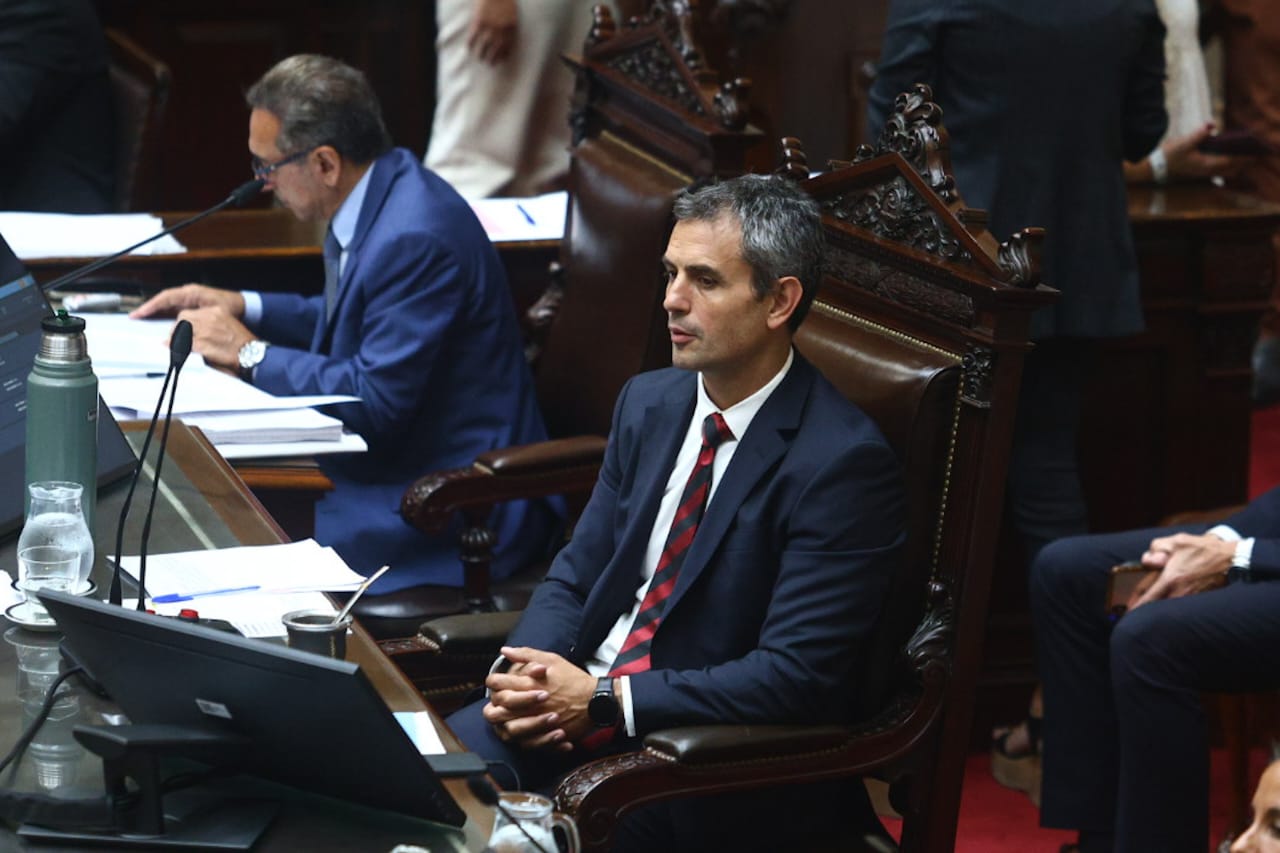
The first day of treatment omnibus law in the Chamber of Deputies ended before 10 p.m. and went to a intermission quarter until Wednesday at 12 noon. Why so late? It is that the government and the collaborationist blocs They continue to negotiate the fine print of the project for the voting in particular of the articles.
Outside Congress there were protests to reject the law and the government’s DNUwith prominence of neighborhood assemblies of CABA and the suburbs, social and left-wing organizations. There was a saturation operation of gendarmerie, prefecture and federal police commanded by Patricia Bullrich. It included provocations by the repressive forces with gas and sticks, but They could not prevent Rivadavia Avenue from being closed during the afternoon while protesters continued to arrive leaving their jobs. The deputy of the Left Unity Front, Alejandro Vilca was gassed by the operation while accompanying the protest. Then he returned to the venue and took the floor to repudiate what was happening: “It is impossible for the discussion of the law to continue with repression outside”. He was accompanied by the other deputies from the left who also left the session on several occasions to support the mobilization: Myriam Bregman, Christian Castillo, Nicolás del Caño and Romina del Plá. Bregman harshly criticized the security minister in the midst of the repression: “There is no protocol, there is a Patricia Bullrich with a military soul who cannot stand it”.
At night, after the session ended, there were arrests, including 4 women. Assembly members and social organizations and left-wing parties will gather again starting at 5 p.m. in front of Congress to continue with their demands.
What we left the first day in Congress It was, above all, the confirmation of the collaborationist blocs willing to give Milei a victory. With the quorum and several speeches, they are firm to vote for the government on the law in general: the PROthe entire block of the UCRmost We make Federal Coalition, Federal Innovation (from governors close to Massa and several deputies elected by Unión por la Patria), and the three Tucumans who respond to Governor Jaldo of Unión por la Patria and have just separated from the bloc.
Those who expressed the rejection of the omnibus law as a whole they are Union for the Homelandhe Left Front2 Santa Fe socialists and the Cordoban Natalia de la Sota (who make up Pichetto’s bloc) and 2 deputies from Santa Cruz (from Governor Claudio Vidal).
In addition to fiery speeches from both sides, the first day of treatment left the elimination of 163 articles from the opinion. There are the famous fiscal chapter, the changes in retirement mobility, some articles in the security chapter although they do not change the essentials of the criminalization of social protest, among others as we detailed this Tuesday. But these are not all the changes: there are more, but they continue to be negotiated. That is why the final text that will be put to a general vote this Wednesday does not appear. The manipulation with the opinion and the modifications that were negotiated with the population’s back turned, were the reason for requests for annulment from the Left Front, and the motion for it to be debated again in Union for the Homeland commissions.
New negotiations with a Milei official
While the session was going on this Tuesday, in another Congressional office the deputy chief of staff José Rolandi. Es the second of Nicolás Posse, and served as interlocutor of the executive branch.
The most committed blocks in this new round of negotiations are the UCR and We Make Pichetto’s Federal Coalition who ask for more changes. One of the protagonists of the conversations assured this medium that The areas for the delegation of powers have already been agreed uponwhich would finally be 6 and for 1 year (extendable for 1 more): economic, financial, security, administrative, tariff and energy. In these matters, Javier Milei could govern with total discretion through delegated decrees. This is one of the points most questioned by the Left Front. As Myriam Bregman warned, “everything that does not appear in this law, Milei will do the same through delegated powers.”
But the session ended up being called for this Wednesday later than planned, because The conversations are stuck especially in the articles referring to privatizations. The UCR and Hacemos have already abandoned their initial proposal, which was to reject any package privatization (with a list of public companies). Now They are dedicated to trying to reduce the list of 40 companies proposed by La Libertad Avanza. “We propose that they be between 10 and 14” revealed one of the protagonists, although without specifying which ones. The Civic Coalition in its minority opinion had already proposed an “alternative” list with 17 public companies subject to package privatization. Among them, they include public media such as Telam, Aerolíneas Argentinas and Ferrocarriles. The dialogueists also want to include some more controls from Congress, although everything reviving the Menemist legislation of the ’90s that destroyed jobs and auctioned off public assets for the business of a few.
Another of the chapters that continues to generate differences is that of Security. Although the ruling party withdrew several of his articles this Tuesday, it maintains others that will have a serious impact on social protest and trigger-happy action. The UCR is betting that those who legalize “the Chocobar doctrine” will withdraw: the license to kill from behind under the umbrella of “legitimate defense.” In addition, the government maintains a modification to the Penal Code to punish those who are part of the social protest with between 1 and 4 years in prison, among others that go in the same direction. From radicalism they try to make the sentences shorter. The left was one of the voices that most denounced this chapter, warning about the seriousness of this attack on the most basic rights and freedoms. Other dialogue blocks do not view this chapter favorably either and express their doubts in a more reserved manner.
At the time of the particular vote, both the UCR and Hacemos will not act unified as blocks, and are expected divided votes in both cases.
It is Wednesday there will be a new hot day in the streets and in Congress. It is estimated that the general vote would only take place around 10 p.m. Is he deadline of the negotiators: before they cast their vote, the deputies will have to read all the changes they negotiated to make to the opinion, and there will surely be disagreements and controversies. For now, “the givers of governability” to Javier Milei will have almost all day to follow the thread for a law that seeks to benefit large businessmen with enormous tax benefits, and is one of adjustment and repression against the majorities. In Plaza Congreso and other squares in the country, the protests will continue to reject it. Discontent with the CGT leadership reappears, and the protesters demanded that they call and participate in the mobilization. Nicolás del Caño echoed the demand and said at the venue that “The CGT has the responsibility of continuing the strike against Milei’s chainsaw plan and the liquefaction of income.”
Source: www.laizquierdadiario.com

